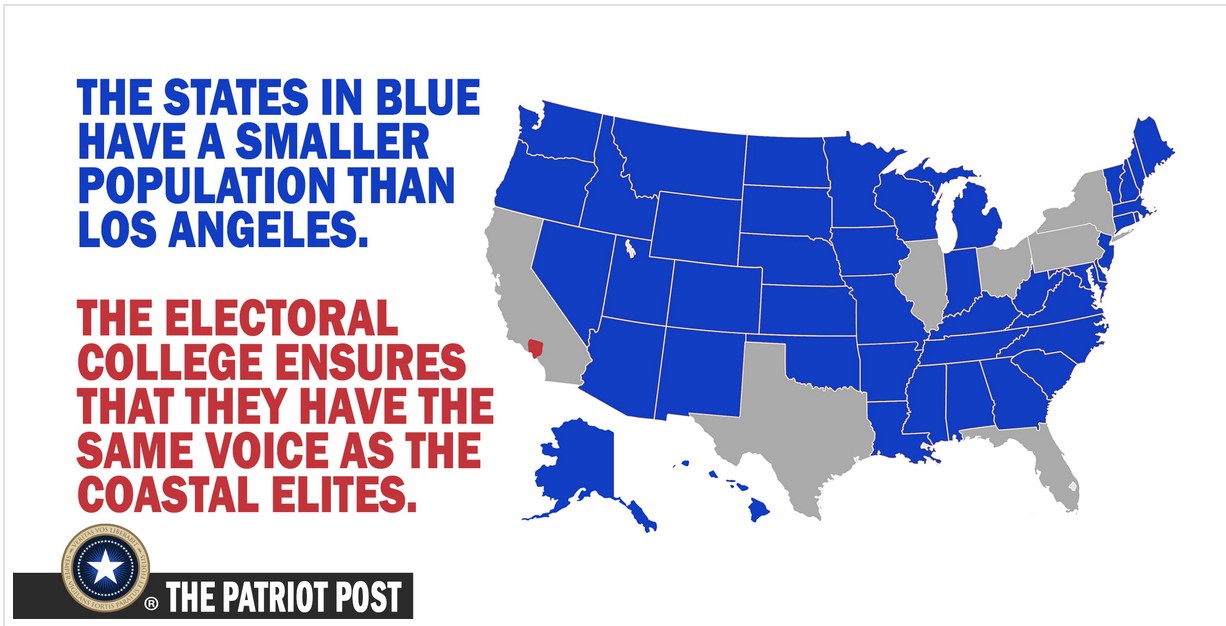 Electoral College
vs. National Popular Vote (NPV)
Electoral College
vs. National Popular Vote (NPV)
 Electoral College
vs. National Popular Vote (NPV)
Electoral College
vs. National Popular Vote (NPV)
The Founder's answer in preventing tyrannical mob rule.
The wisdom of the Founders in treating each state equally and fairly. Something you would think liberals would promote. Is California more equal than South Dakota? NPV is an attempt to make the Presidential Elections unfair between states.
The Electoral College developed at the Constitutional Convention of 1787, was a compromise among plans for a national popular. The Electoral College acts as a State check on Federal power and mob rule, protecting smaller States ensuring Liberty and justice for all Americans, the premise of the U.S. Constitution.
Alexander Hamilton speaking of the Electoral College: “If the manner of it be not perfect, it is at least excellent.”
![]()
![]() Home
Home
![]() About
About
![]() Contact
Contact
![]() Search
Search
![]() News,
Commentary, & Action
News,
Commentary, & Action ![]() Recommended Books
Recommended Books![]()
The Electoral College Represents a Constitutional Republic, not a tyrannical "pure" Democracy of bullying that the "National Popular Vote" advocates, where only every California vote counts more than any other vote from almost half the rest of the country. (See "A Republic, not a Democracy.")
See also: Save Our States defends our state-by-state presidential election process—the Electoral College—as an essential part of our constitutional system of states and a protection of our freedom.
Contents
Reason & Value of the Electoral College
Why the "National Popular Vote" (NPV) Violates Equal Statehood
How the Electoral College prevents Tyranny of the Majority
![]()
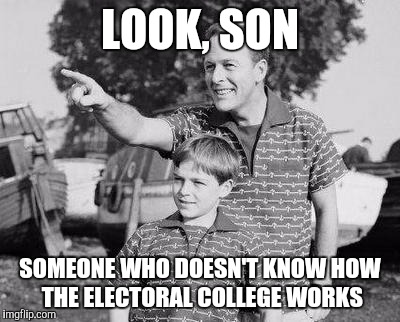 Reason
& Value of the Electoral College
Reason
& Value of the Electoral College
What is “undemocratic” is an agreement that means that even if every single voter in a state voted against a presidential candidate who won the national popular vote, the state would still have to give all its electoral votes to that candidate. --Hans von Spakovsky
The Enduring Value of the Electoral College - By Jeff Jacoby ...In some democracies, such as France, Brazil, or Ghana, the head of state is elected directly by the people. That has never been the system in the United States. At the Constitutional Convention in 1787, the framers debated at length the question of how presidents should be chosen. In the end they rejected the idea of electing presidents in a single national plebiscite. They settled, rather, on a federal plan — one in which Americans would come together to choose a president (and vice president), but would do so as citizens of their respective states. That compromise reflected America’s fundamental identity not as a single broad mass of people, but as a union of individual states, each with its own social, political, and cultural character. Massachusetts, Montana, and Mississippi are very different entities. The Electoral College system ensures that those differences are respected, while guaranteeing the right of all adult citizens to participate in the vote. Like anything manmade, the Electoral College has its drawbacks, which its foes loudly bewail. But give those drawbacks a closer look, and they turn out to be fairly insubstantial.
- By Paul Strand - ...The Birth of the Electoral College Back in the 18th century, after winning a war for their independence, colonists weren't about to surrender their newly-won power and freedom. It's important to remember when America was being formed, it was basically 13 sovereign entities having to agree to come together to form a nation, and each one of those entities had to be respected to win their acquiescence. Those cursing the creators of the Electoral College should remember the tough sales job the Founders had. "They forget that these Founders had to get agreement of all the states to form this union, and part of that agreement was how we came up with a system to elect people," frequent political commentator Rich Kelsey told CBN News. This system makes a presidential candidate have to win the states, not just individual voters. That ensures less-populated states have a voice.
By: Sarah Cowgill - The Electoral College is one of America’s top political discussion topics, as well as how we pick our president every four years, yet it still isn’t very well understood by many. What is the Electoral College, and why do we even have it? During the Constitutional Convention in 1787, one of the most critical issues our Founding Fathers wanted to settle was how to pick the president. Many wanted a straight popular vote. However, others were worried that this would give too much power to states with big cities, like New York. This would mean states with fewer people wouldn’t really get a say in it.
According to the U.S. Constitution, every four years the president and vice president are chosen by a group of electors, collectively called the Electoral College. The Constitution says electors can’t be anyone in a federal office, but otherwise leaves it up to the individual states to regulate. Today, there are 538 electors. That’s one for each member of the House of Representatives, one for each Senator, and three for the District of Columbia.
How Electors Are Selected: Every state appoints its electors according to its own laws. Most state parties select their number of electors at the county, district, or state conventions. On Election Day, whoever wins the popular vote in the state typically gets all electors. But results are not certified until the electors meet on the first Monday after the second Wednesday in December.
Faithless Electors: The process of electing the president is usually smooth and transparent – but there have been exceptions. In some cases, electors go against the popular vote result in their state and vote for whoever they want. But electors don’t break faith often. When they do, they usually don’t vote for the other leading candidate. Instead, it’s usually to make a political statement. ...In 2020, the U.S. Supreme Court ruled states do have the constitutional power to force electors to vote along with their popular vote. And although every state can prevent faithless electors, they are not required to do so.
Video: Is the Electoral College at Odds With the Constitution?
— Matt Christiansen rebuts Chris Hayes for an absurd argument against American government.Jordan Sekulow ACLJ Executive Director: From Bald Beagle, an educational channel for kids. “What Is the Electoral College?” This fun kids’ video is meant to simplify this Electoral College thing they’ll be hearing about over the next week. As we’ve seen in the media, even adults could use this refresher on how our Constitution sets up electing the President. Within hours, extreme Leftists and atheists began attacking the video and the ACLJ for “brainwashing” kids with conservative propaganda. Bald Beagle is our brand-new channel creating engaging, educational content that illustrates the great – and sometimes complicated – history of our country. Our videos help explain how the government works, and highlight the moral principles it was founded on. Not surprisingly, the Left hates that. They want America’s history erased and rewritten. In their twisted new American story, conservatives and people of faith will be the villains. Talk about brainwashing. We cannot allow America to become a dystopian socialist nightmare. Children are the future of our nation. They need to know the truth. Watch the video with your kids and grandkids.
The Constitutional Convention discusses presidential selection
- by Tara Ross - ... Despite these random ideas, two election methods stayed at the forefront of the discussion for much of the Convention: legislative selection (i.e. Congress chooses the President) versus a national, direct popular election.The small states, in particular, worried about a direct election. They were sure that they would be constantly outvoted by the large states.
Roger Sherman of Connecticut believed that the “largest State will have the best chance for the appointment.” Charles Pinckney of South Carolina agreed. “An Election by the people,” he observed, “[is] liable to the most obvious & striking objections. They will be led by a few active & designing men. The most populous States by combining in favor of the same individual will be able to carry their points.”
At one point, another delegate from Delaware admonished the large states rather forcefully. “I do not, gentlemen, trust you,” Gunning Bedford thundered. “If you possess the power, the abuse of it could not be checked; and what then would prevent you from exercising it to our destruction?”
Ultimately, the delegates brokered a compromise. As it operates today, our elections are a blend of democracy (state-level elections among individuals on Election Day) and federalism (an election among the states themselves in the Electoral College vote). Large states have more electoral votes, reflecting their greater populations. But small states are guaranteed a minimum of three votes, no matter what.
The Electoral College has come under attack in recent months. It’s been called archaic, a relic of slavery—and even worse. Some of these allegations are in danger of becoming conventional wisdom, yet nothing could be further from the truth. To the contrary, the delegates had at least one, much bigger concern that summer: How could the needs of large vs. small states be balanced? They took the matter seriously, discussing the issue of presidential selection on 21 separate days at the Constitutional Convention. The matter prompted more than 30 distinct votes.
The Electoral College was created with much thought and great care. If nothing else, the system deserves serious study before it is too casually thrown away by a generation that didn’t first take time to understand it.
The Essential Electoral College: Origins of the Electoral College
: (Heritage Foundation) The Founders’ Design - How Does the Electoral College Actually Work? - Contingent and Disputed Elections - The Benefits of the Electoral College - Debunking Myths and Misinformation - Current Threat: National Popular Vote Movement - A Constitutional System Worth Preserving - Resources to Learn More and Endnotes - Endorsements
![]()
Why the National Popular Vote (NPV) Violates Equal Statehood
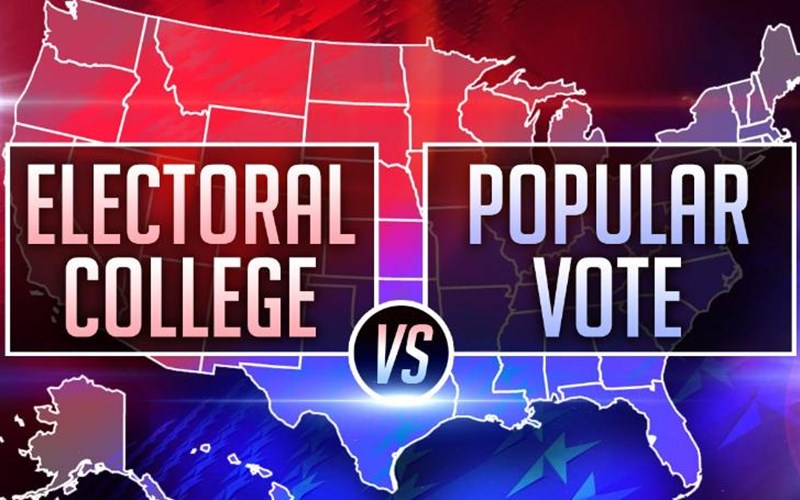 Federalism: In the United States, the Constitution grants
certain powers to both the U.S. government and the state governments. These
powers are granted by the Tenth Amendment, which states, “The
powers not delegated to the United States by the Constitution, nor prohibited by
it to the States, are reserved to the States respectively, or to the people.”
Federalism: In the United States, the Constitution grants
certain powers to both the U.S. government and the state governments. These
powers are granted by the Tenth Amendment, which states, “The
powers not delegated to the United States by the Constitution, nor prohibited by
it to the States, are reserved to the States respectively, or to the people.”
Rural Americans would be serfs if we abolished the Electoral College
- By Trent England - Should rural and small-town Americans be reduced to serfdom? The American Founders didn’t think so. This is one reason why they created checks and balances, including the Electoral College. Today that system is threatened by a proposal called the National Popular Vote Interstate Compact, or NPV.Rural America produces almost all our country’s food, as well as raw materials like metals, cotton and timber. Energy, fossil fuels but also alternatives like wind and solar come mostly from rural areas. In other words, the material inputs of modern life flow out of rural communities and into cities.
Do You Understand the Electoral College? - PragerU Video By
Tara Ross ...The President and Vice President of the United States are not
chosen by a nationwide, popular vote of the American people; rather, they are
chosen by 538 electors. This process is spelled out in the United States
Constitution.
Why didn't the Founders just make it easy, and let the Presidential
candidate with the most votes claim victory? Why did they create, and why do we
continue to need, this Electoral College? The answer is critical to
understanding not only the Electoral College, but also America.
The Founders had no intention of creating a pure majority-rule
democracy. They knew from careful study of history what most have forgotten
today, or never learned: pure democracies do not work. They implode. Democracy
has been colorfully described as two wolves and a lamb voting on what's for
dinner. In a pure democracy, bare majorities can easily tyrannize the rest of a
country. The Founders wanted to avoid this at all costs.
...The Presidential election happens in two phases. The first phase
is purely democratic. We hold 51 popular elections every presidential election
year: one in each state and one in D.C. On Election Day in 2012, you may have
thought you were voting for Barack Obama or Mitt Romney, but you were really
voting for a slate of presidential electors. In Rhode Island, for example, if
you voted for Barack Obama, you voted for the state's four Democratic electors;
if you voted for Mitt Romney you were really voting for the state's four
Republican electors.
Part Two of the election is held in December. And it is this
December election among the states' 538 electors, not the November election,
which officially determines the identity of the next President. At least 270
votes are needed to win.
Why is this so important? Because the system encourages
coalition-building and national campaigning. In order to win, a candidate must
have the support of many different types of voters, from various parts of the
country. Winning only the South or the Midwest is not good enough. You cannot
win 270 electoral votes if only one part of the country is supporting you. But
if winning were only about getting the most votes, a candidate might concentrate
all of his efforts in the biggest cities or the biggest states. Why would that
candidate care about what people in West Virginia or Iowa or Montana think?
...The Electoral College is an
ingenious method of selecting a President for a great, diverse republic such as
our own -- it protects against the tyranny of the majority, encourages coalition
building and discourages voter fraud. Our Founders were proud of it! We can be
too.
Blue States Ready to Subvert Electoral College - The National Popular Vote Interstate Compact means the winner takes all votes. - By Lewis Morris - The weapon of choice in their effort to destroy one of our last vestiges of federalism is the Compact. You may recall that the Compact, which began in 2007, calls on its state signatories to pledge their electoral votes in presidential elections to whichever candidate wins the national popular vote. The Compact goes into effect when there are enough states on board to reach 270 electoral votes. It currently has 181. It’s unlikely to reach the magic number by the 2020 election, but it hopes to be a game changer by 2024. Fortunately, the Compact has pretty much exhausted the pool of true-blue states, making the going tougher for states with split legislatures that are solid red. Republican voters in general don’t have a problem with the Electoral College.
...What would you think as a voter if the majority of your state voted for one candidate, but the state decided that, since the other candidate won the national vote, your vote was being awarded to someone you did not support? You wouldn’t feel like your vote mattered, that’s for sure. If anything, 2016 proves that we do need an Electoral College. Clinton almost had it locked up by campaigning in only a handful of urban areas — mostly the big blue vote buckets like LA, NYC, Chicago, and San Francisco. None of this can be explained to leftists, though. They cannot win in the arena of ideas, so they want to change the rules of the game. So far, they have been very clever about exploiting the so-called problems of the Electoral College. The first thing to remember is that there is no problem with the Electoral College. Except if you are a Democrat who can only win by pitting segments of the nation against one another.
- by Jeff Jacoby ...The standard indictment against the Electoral College is that it’s anti-democratic. It is, of course: The framers of the Constitution devised it deliberately as a check on direct democracy, one of many such checks and balances — think of the power they entrusted to unelected Supreme Court justices, or to a Senate in which states, not people, are equal. Again and again, the Founders went to great lengths to thwart blind majority rule, not wanting important national decisions to be driven by unbridled public emotion, populist demagoguery, or the passions of the mob. The direct election of the president, argued Elbridge Gerry as the Constitution was being drafted in the summer of 1787, could lead to “radically vicious” outcomes. Hence the interposition of an Electoral College, which ensures that presidents are elected not in one national plebiscite, but through elections within each state to choose electors.
...The ticket that racks up the most votes nationwide nearly always wins a majority of the Electoral College. But twice in the last two decades, the popular-vote winner lost the electoral vote. Both times a Republican ended up in the White House, which explains why so many Democrats are now on the warpath against the Electoral College. All the states that have voted to join the National Popular Vote compact are solid blue states; except for Colorado, none has voted Republican in a presidential election for at least 30 years.
...Critics of the Electoral College denounce it as undemocratic — but what could be less democratic than state legislatures deliberately nullifying the choice of a majority of their state’s voters? For a nation like ours — ideologically quarrelsome, geographically vast, socially diverse — the advantages of the Electoral College far outweigh its drawbacks. It guarantees that no one can become president without demonstrating an appeal that crosses state, regional, and communal lines.
...Above all, it balances federalism with democracy: It preserves the central role of the states in American life without sacrificing the principle of one-person, one-vote. With good reason, Alexander Hamilton pronounced the Electoral College system an “excellent” arrangement. With good reason it has endured for 225 years. Presidents come and presidents go, but the Constitution’s system for choosing them is here to stay.
Abolishing the Electoral College Is Unconstitutional and Wrong
- By Michael Busler - The Electoral College was established to try to balance the popular vote with the need for states rights. There are 538 electors in the electoral college. Each state is given one elector for each member of the House of Representatives (435 in total) plus one additional electors for each of the two senators (100 in total). The District of Columbia gets three electors. If the Electoral College was abolished and the president elected simply by a majority in the national vote, the majority of people from smaller, less populated states would lose their voice in presidential elections. A number of states have already considered having their electors vote for the candidate who gets the majority of the national vote. This would mean candidates would campaign mostly in densely populated states while ignoring the less populated states.It is one of the Constitution’s accidentally great procedural features for deterring the concentration of political power. - By Sean J. Rosenthal - ...according to Madison, having a lot of people with diverse interests restrains federal power and protects liberty by deterring the formation of oppressive majorities (Federalist #10:).
Election 2016 Numbers 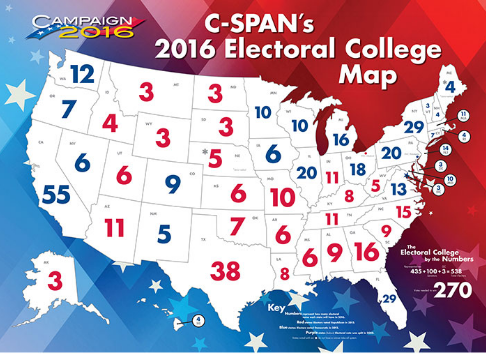 |
Election 2016 By State  |
Election 2016 By County 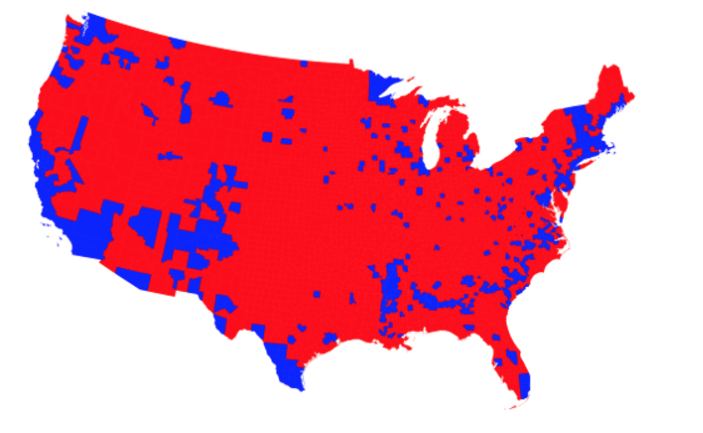 |
John Michael Saraceno: This is one of the best cases for the Electoral College... So easy a progressive can understand!
For all the people who fell asleep in civics class...
1: There are 3,141 counties in the United States. Trump won 3,084 of them.
Clinton won 57.
2: There are 62 counties in New York State. Trump won 46 of them. Clinton won 16.
3: Clinton won the popular vote by approx. 1.5 million votes.
4: In the 5 counties that encompass NYC, (Bronx, Brooklyn, Manhattan, Richmond & Queens) Clinton received well over 2 million more votes than Trump. (Clinton only won 4 of these counties; Trump won Richmond) Therefore these 5 counties alone, more than accounted for Clinton winning the popular vote of the entire country.
5: These 5 counties comprise 319 square miles. The United States is comprised of 3,797,000 square miles.
6: When you have a country that encompasses almost 4 million square miles of territory, it would be ludicrous to even suggest that the vote of those who inhabit a mere 319 square miles should dictate the outcome of a national election.
Large, densely populated Democrat cities (NYC, Chicago, LA, etc) don’t &
shouldn’t speak for the rest of the country.
And this children is WHY you have an Electoral College. It's a safety net so
that EVERYONE's vote counts.
![]()
Why the Electoral College prevents the Tyranny of the Majority
Exodus 18:17-27 is the basic foundation of our Republic and its premise of how representative Republic is framed. The Electoral College was designed to keep this foundation from being undermined by preventing parts of the country being tyrannical over the other parts.
Exodus 18:17-27 (BBE) - And Moses' father-in-law said to him, What you are doing is not good. Your strength and that of the people will be completely used up: this work is more than you are able to do by yourself. Give ear now to my suggestion, and may God be with you: you are to be the people's representative before God, taking their causes to him: Teaching them his rules and his laws, guiding them in the way they have to go, and making clear to them the work they have to do. But for the rest, take from among the people able men, such as have the fear of God, true men hating profits wrongly made; and put such men over them, to be captains of thousands, captains of hundreds and of fifties and of tens; And let them be judges in the causes of the people at all times: and let them put before you all important questions, but in small things let them give decisions themselves: in this way, it will be less hard for you, and they will take the weight off you. If you do this, and God gives approval, then you will be able to go on without weariness, and all this people will go to their tents in peace. So Moses took note of the words of his father-in-law, and did as he had said. And he made selection of able men out of all Israel, and made them heads over the people, captains of thousands, captains of hundreds and of fifties and of tens. And they were judges in the causes of the people at all times: the hard questions they put before Moses; but on every small point they gave decisions themselves. And Moses let his father-in-law go away, and he went back to his land.
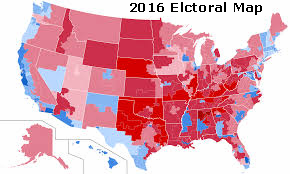
It takes a bare minimum of 270 electoral votes to win the presidency. Had Clinton received all 46 electoral votes in the blue wall states of Wisconsin, Michigan, and Pennsylvania, she would have gotten 273 electoral votes. She then could afford to lose only the least populous of those three states, Wisconsin, and still prevail, but only if she were also awarded all seven votes of the faithless electors. In which case, Clinton would have won with a grand total of 270 electoral votes.
...Some progressives think we should junk the Electoral College and elect presidents with the popular vote. Other progressives think we should rejigger the College and allocate its votes in a way that is closer to the popular vote. But if one believes in federalism, the above data argues just the opposite. We can’t have the preferences of two populous coastal states being imposed on the other 48 states merely because they have some tiny majority. That’s especially so when those two states are so very different from the rest of the country. Let California have its tent cities, its free healthcare for illegal aliens, and its San Francisco values, but leave us “hicks” in the heartland alone.
Given the above, I think we can say that in 2016 the Electoral College worked as intended, and that America got the correct president, the one she needed. Even so, the electoral vote is derived from the popular vote, so there’s still the nagging little question of what the legitimate popular vote count really was.
Preventing 'The Tyranny of the Majority' - By Edwin J. Feulner ...Being a republic, we also don’t pick our president through a direct, majority-take-all vote. We have an Electoral College. And a lot of liberals don’t like that. Their attacks on the College are nothing new, but the defeat of Hillary Clinton in 2016 renewed their fury. After all, as they never tire of pointing out, Mrs. Clinton captured more of the popular vote than Donald Trump did. They see the Electoral College as an impediment to their political victories, therefore it’s got to go.
...Were it not for the Electoral College, presidential candidates could act as if many Americans don’t even exist. They could simply campaign in a small handful of states with big populations. Who would care what the people in Iowa think? Or Wyoming? Or any number of other states with smaller populations? The people in “flyover country” don’t get enough attention as it is, but without the Electoral College, they’d be completely at the mercy of the majority.
INTERVIEW: The Electoral College is Under Threat - By
Sonny Joy
Nelson - ...In explaining why the Presidential election should be decided
via the Electoral College and not the Popular Vote, Monk stated: “Proponents of
the National Popular Vote play on the misinformation and lack of education of
many American voters, especially young people. They make the (false) claim that
the popular vote method will truly value ‘each individual vote’.
Under their misleading premise, by “making each vote count
equally”, political candidates will have to campaign in every state equally to
earn those votes. In reality that could not be further from the truth. The
purpose of the electoral college is to prevent the densely populated urban
areas, where a majority of the population lives, from picking all of our
presidents.
By distributing the electoral votes to the states based on their
number of representatives in Congress, each state is given a voice, even a small
one, despite having a fraction of the population. Take Wyoming, which has barely
600,000 population, and California which has nearly 40,000,000. That means for
every one voter in Wyoming, there are 66 voters in California. In a popular vote
system, candidates would be smart to go where the voters are, and at a ratio of
66 to 1, the voters are in California (or other highly populated states.)
The Electoral College allows for all states to have a say in our
executive branch whereas the National Popular Vote would give the power of
deciding the Executive branch over to the large urban areas of California, New
York, Illinois, Florida, Texas and the like. The CITIES would pick the
president.
The National Popular Vote, instead of enfranchising all of our
votes, would actually disenfranchise the votes of all of the “fly over states”
and much of the known Republican base. It is no secret that the Democrats have
much more control of the urban areas.
The National Popular Vote Interstate Compact is nothing more than an attempt to
greatly empower the Democrat strongholds while robbing the Red States of their
voting power.”
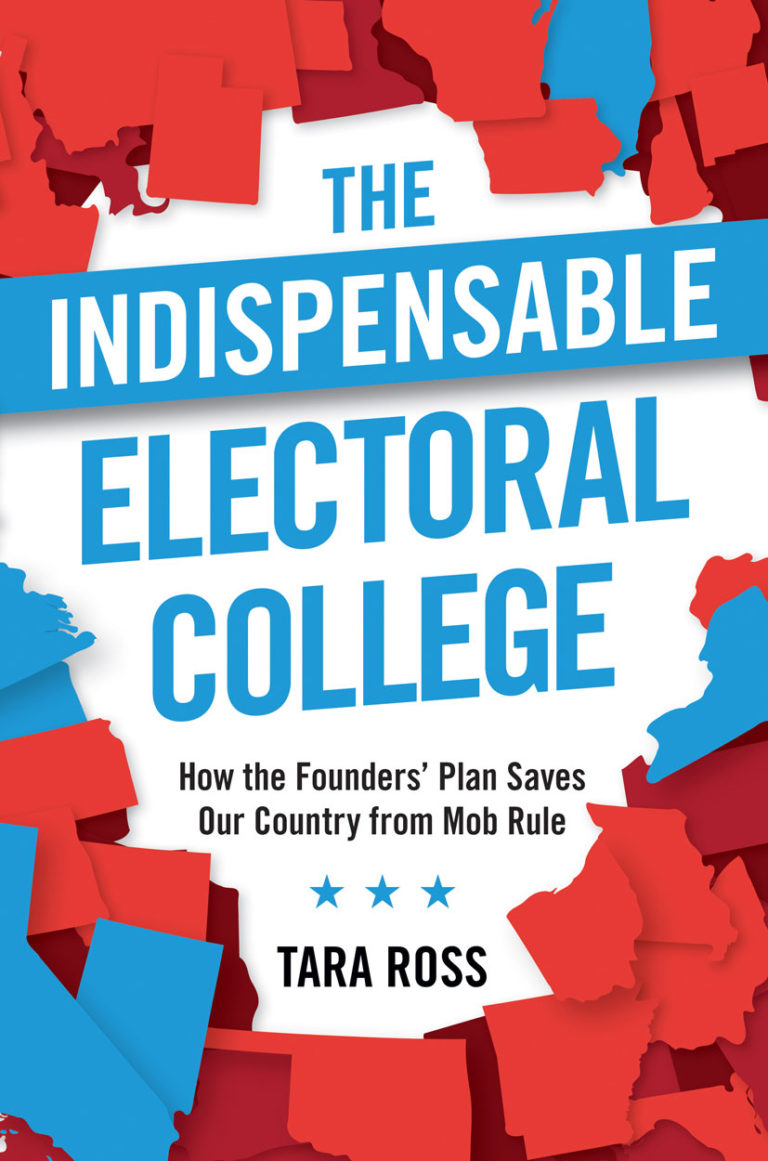
...The delegates were discussing separation of powers. Slavery was
not their focus. Indeed, the debates about the presidential election process
never focused on slavery. Instead, the delegates discussed whether legislative
selection or a national popular vote was preferable. The division was between
large and small states, not between slave and free states.
Some of the larger states had slaves, some did not. Some of the
smaller states had slaves, some did not. All of the small states, however—slave
and free—were worried about the dangers of a simple national popular vote. As
slavery opponent Gunning Bedford of Delaware had said so eloquently, the small
states simply feared that they would be outvoted by the large states time and
time again.
The Electoral College had everything to do with balancing power
between large and small states in America’s new experiment in self-governance.
It had nothing to do with slavery. What an inconvenient truth for those who
would like to eliminate the system.
Excerpts from “The
Indispensable Electoral College: How the Founders’ Plan Saves Our Country from
Mob Rule” (Regnery Gateway, 2017).
The final three weeks of the Constitutional Convention, 1787. Congressional matters have largely been decided, and the delegates move their attention to the executive branch. After much debate pitting national and federal powers against each other, the Electoral College is proposed and adopted: as with the Connecticut Compromise, the president would be elected by a combination of the people and the states.
"Republics decline into democracies and democracies degenerate into despotisms." - Aristotle (384-322 BC)
"[In a pure democracy], [a] common passion or interest will, in almost every case, be felt by a majority of the whole; a communication and concert results from the form of government itself; and there is nothing to check the inducements to sacrifice the weaker party or an obnoxious individual. Hence it is that such democracies have ever been spectacles of turbulence and contention; have ever been found incompatible with personal security or the rights of property; and have in general been as short in their lives as they have been violent in their deaths." James Madison
"A democracy is nothing more than mob rule, where fifty-one percent of the people may take away the rights of the other forty-nine." --Thomas Jefferson
o The
National Popular Vote: a perfectly horrendous idea - By Bryan
Fischer - The NPV has now been adopted by 11 states, with New York being the
latest to sign on just this week. NPV provides that, if enough states sign
compacts with other states, every state which belongs to the compact will
automatically award all of its electoral votes to whichever presidential
candidate wins the nationwide popular vote. New York just added its 29 electoral
votes to the plan, bringing the total number of electoral votes controlled by
NPV to 165, or 61 percent of the total needed for the plan to take effect.
Thus the citizens in states which cast a majority of votes for the
candidate who loses the nationwide popular vote would be instantly
disenfranchised. The Founders would roll over in their ballot boxes to see this
monstrosity make any progress in the nation they built. The Founders established
the Electoral College instead of a direct popular vote precisely because pure
democracy quickly descends into mob rule. They understood fallen humanity, and
knew how easily and quickly the masses can be deceived by charlatans and
populists into voting for whoever will tickle enough ears and promise enough
goodies.
Said James Madison, the Father of the Constitution: "Democracy is
the most vile form of government. ... democracies have ever been spectacles of
turbulence and contention; have ever been found incompatible with personal
security or the rights of property: and have in general been as short in their
lives as they have been violent in their deaths."
You naturally will ask, does this mean the Founders did not trust
the collective electoral wisdom of the people? That's exactly what it means.
They knew the susceptibility of frail human beings to demagoguery and how
quickly a society could unravel under pure democracy. This is how John Adams put
it: "Democracy will soon degenerate into an anarchy; such an anarchy that every
man will do what is right in his own eyes and no man's life or property or
reputation or liberty will be secure, and every one of these will soon mould
itself into a system of subordination of all the moral virtues and intellectual
abilities, all the powers of wealth, beauty, wit, and science, to the wanton
pleasures, the capricious will, and the execrable [abominable] cruelty of one or
a very few."
As a protection against mobocracy, in virtually every circumstance
the Founders sought to insert a layer of insulation between the people
themselves and the selection of public officials and the formation of public
policy. The whole point of the Electoral College was that voters wouldn't even
vote for a president. They would vote instead for electors, who in turn would
select a president for them. The only, absolutely the only, public officials who
were placed into office by a direct vote of the people were members of the House
of Representatives.
Presidents were to be chosen by electors, not by the people.
Senators were to be chosen by state legislatures, not by the people. Judges were
to be chosen by the president with the advice and consent of the Senate, not by
the people. The original design of the Electoral College was that we the people
would not choose a president but rather would choose the people who would choose
a president for us. November elections were intended to be elections in which we
chose electors, not presidents.
The intention of the Founders was that there would be, in today's
terms, 538 separate campaigns for the office of elector, in which candidates for
that office would seek to convince us that they could be trusted with that most
important of decisions, the selection of the next president of the United
States. Once they had chosen a president, their term of office would come to an
end.
This is a subject for another day, but it would be best for us to
award electoral votes congressional district by congressional district rather
than state by state. Nebraska and Maine already do this. Rural districts in
states with huge population centers such as New York and California often feel
disenfranchised, as if their votes don't count and don't matter. It would be far
better to award one electoral vote to every single congressional district, with
two additional electoral votes (for each of the their two senate seats) awarded
to the winner of each state's popular vote. We should be moving toward this as a
goal, not toward the republic-destroying National Popular Vote.
The NPV is a drastic lurch away from a republican form of
government and should be firmly, immediately and persistently resisted. Benjamin
Franklin famously told us that the Founders had given us "a Republic, if you can
keep it." The NPV is just about the fastest way to destroy what is left of that
republic. As Founding Father Benjamin Rush put it, "A simple democracy is the
devil's own government." I prefer the government of the Founders over the
government of the Prince of Darkness. And so should you.
o There’s No Good Reason To Get Rid Of The Electoral College By DOUG MATACONIS - As for myself, as I’ve noted here in the past I tend to support the continued existence of the Electoral College, with the modification that I would like to see the individual states adopt the District Method for allocation of electors as Maine and Nebraska have done. More importantly, though, I’ve found the arguments against the Electoral College to be lacking.
...As Daniel Foster says, the Electoral College serves to make Presidential elections truly national, requiring candidates to register support not just in the high population areas on the East and West Coasts but also in the interior of the nation where interests vastly different from those of the Boston-New York-Washington corridor and the San Francisco-Los Angeles-San Diego corridor motivate voters. It also reinforces whatever remaining strands of Federalism still exist in this country, thus challenging the idea that all wisdom must come from Washington.
...The advocates of eliminating the Electoral College are proposing what is, without a doubt, a radical change to our Constitutional structure. Potentially, it would have a significant impact on the relationship between the Federal Government and the states regarding the question of who exactly is the final authority when it comes to deciding the outcome of an election.
o National Popular Vote: Goodbye, Sweet America By Publius Huldah - Our Constitution is under constant attack.1 One of the most pernicious attacks is being waged by those who seek to override the constitutional provisions under which The States, as political entities, elect the President; and to replace it with a national popular vote (NPV) under which inhabitants of major metropolitan areas will choose the President. What Form of Government Did We Create In Our Constitution? Before you can see why it is so important that The States elect the President, and why the NPV is so execrable, you must understand how our “federal” government was structured and intended to operate. “Federal” actually referred to the form of the national government created in our Constitution, and to the division of powers between the national government and The States. The “Federation” created by our Constitution is an alliance of independent and sovereign States associated together in a “confederation” with a national government to which is delegated authority over the States in specifically defined areas ONLY (national defense, international commerce & relations; and domestically, the creation of an uniform commercial system: weights & measures, patents & copyrights, a monetary system based on gold & silver, bankruptcy laws, and mail delivery). Those enumerated powers are the only areas wherein the national government has lawful (constitutional) authority over The States. In all other matters, the States retained supremacy, independence, and sovereignty.
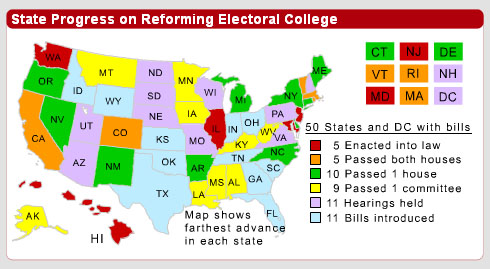
![]()